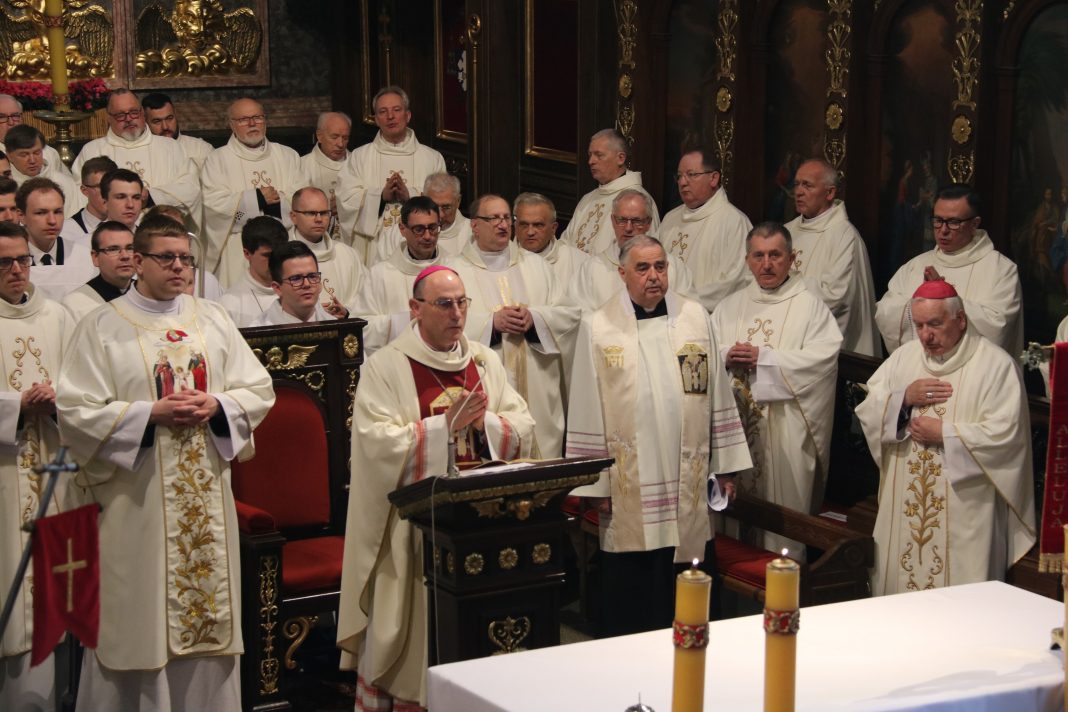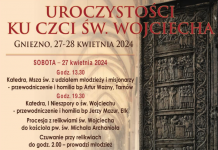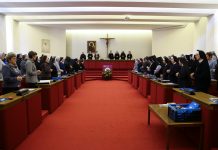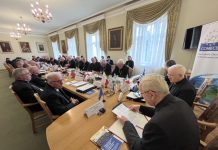The attitude of the Polish clergy during World War II, their faithfulness and steadfastness in times of persecution up to the literal sacrifice of their priestly lives, to martyrdom, undoubtedly grew out of a spirit of courageous and self-sacrificing service to God and brothers,” said Polish Primate Archbishop Wojciech Polak, who presided at Mass at the National Shrine of St Joseph in Kalisz as part of the celebrations of the Day of the Martyrdom of the Polish Clergy.
In his homily, the celebrant recalled that the priests – inmates of the Dachau concentration camp – offered themselves and the other inmates to the care of St Joseph on 22 April 1945. When freed from the camp captivity a week later, on 29 April, they attributed this fact to the grace received from God, through the intercession of St Joseph.
„Since then, every year, on the anniversary of their liberation, that is on 29 April, they have made a pilgrimage here, to this shrine of St Joseph in Kalisz. The Church in Poland, seeing the steadfast testimony of the faith of priests saved from fascist extermination, established the Day of the Martyrdom of the Polish Clergy during World War II on this day,” the Metropolitan of Gniezno said.
He pointed out that the Day of Martyrdom of the Polish Clergy, which is celebrated every year, allows us to remember all priests who became victims of Nazi and Stalinist terror during World War II. „Among them are also the Katyn chaplains, secretly murdered with other prisoners of war in the Katyn Forest”, the preacher stated.
He recalled the words of Pope John Paul II spoken before the beatification of 108 World War II martyrs. „’They all bore witness to their fidelity to Christ, in spite of the suffering that was appalling in its cruelty. They too are a model for us to follow, from their blood we should draw the strength for the daily sacrifice we have to make to God out of our lives. They are an example for us so that, like them, we may courageously bear witness to our fidelity to the Cross of Christ+,” he quoted the Pope.
The Archbishop stressed that the priests, the martyrs of the Second World War, and all the clergy experiencing persecution and suffering at the hands of the fascist and Stalinist oppressors, were not individual and accidental victims of inhuman cruelty. It is because they were Catholic priests, belonged to the Church, and were Poles and Polish clergy that they were persecuted and suffered.
„They were united to the end and in solidarity in their suffering with those they served. They shared the cruel fate of persecution, suffering and death. They walked beside those who were condemned to extermination and annihilation,” Archbishop Polak pointed out.
He added that among them there was the one whom St John Paul II called „the patron saint of our difficult times”, namely Blessed Bishop Michał Kozal, born in Krotoszyn, a prisoner of the Dachau concentration camp. „+One of thousands who were martyred there, he passed away in the reputation of sanctity, the first one, the master of martyrs, followed by hosts of priests, in whom Christ’s power of love was shown against the madness of violence, destruction, contempt, and hatred+” – he quoted an excerpt from the homily delivered at Bishop Kozal’s beatification.
He pointed out that Pope Francis, recalling the celebration of the Day of Martyrdom of the Polish clergy during World War II at the last Wednesday’s general audience, wished that „the witness of the Polish martyrs should stimulate priests, consecrated persons and the lay faithful, especially young people, to courage and generosity in the service of God and their brothers /and sisters/.”
He said that the attitude of the Polish clergy during World War II, their faithfulness and steadfastness in times of persecution up to the literal martyrdom sacrifice of their priestly lives, grew undoubtedly out of a spirit of courageous and sacrificial service to God and the brothers /and sisters/.
„What does the Church need today”, Pope Francis asked once, and he answered that “also today the Church does need martyrs and witnesses, that is, the saints of daily life,” noted the hierarch.
The Archbishop argued that the Church needs holy priests, men who live out their commitment to God and people faithfully and consistently. „The Church needs those whose life consists of concrete love, that is, of service and availability and desires hearts that are truly consecrated, hearts that draw life from his /Jesus’/ forgiveness in order to pour it out with compassion on our brothers and sisters. Jesus wants hearts that are open and tender towards the weak. He wants docile and transparent hearts that do not dissimulate before those whom the Church appoints as our guides,” he said after Pope Francis.
Prior to the Mass, an exhibition on the priest martyrs of the Second World War opened. A plaque in memory of the chaplain priests murdered in Katyn by the Soviets was also dedicated.
The Day of the Martyrdom of the Polish Clergy was preceded by a two-day Congress of the 108 Blessed Martyrs of the Second World War organized in Krotoszyn and Kalisz.
Established by the Episcopate in 2002, the Day of the Martyrdom of the Polish Clergy is a continuation of the annual thanksgiving of priests – prisoners of Dachau for the liberation from the camp, on 29 April 1945. A week earlier, the prisoners had entrusted themselves to St Joseph and vowed that if they had survived, they would make an annual pilgrimage to St Joseph’s Church in Kalisz. Those priests from Poland who survived have been fulfilling their vow until the end of their lives, making pilgrimages to Kalisz, and giving thanks for their survival. The last of them, Fr Leon Stępniak, died in 2013.
In Dachau, which became the main, though not the only, place of extermination of the Polish clergy, the priests of all denominations, from all over Europe, were persecuted and murdered since the end of 1940. Polish priests were not only the most numerous group among them but were also subjected to the most cruel repressions. A total of 1,780 priests, religious, and seminarians from all over Poland were imprisoned there. Miraculously, 800 survived.
As part of the celebrations of the 25th anniversary of the liberation of the camp, the former prisoners of Dachau, thanks to the efforts of Archbishop Kazimierz Majdański, founded in the crypt of the Kalisz shrine the Chapel of Martyrdom and Gratitude, which was consecrated on 28 April 1970 by the Primate of Poland Cardinal Stefan Wyszyński together with the Metropolitan Archbishop of Krakow Cardinal Karol Wojtyła. In addition to the chapel, the priests, former prisoners of Dachau Concentration Camp, established the Museum and Archive devoted to their camp Gehenna. Five years later they founded the Institute of Family Studies in Łomianki.
ek/Kalisz
Translated by Sr. Ewa Dobrzelecka / Office for Foreign Communication of the Polish Bishops’ Conference

 English
English







